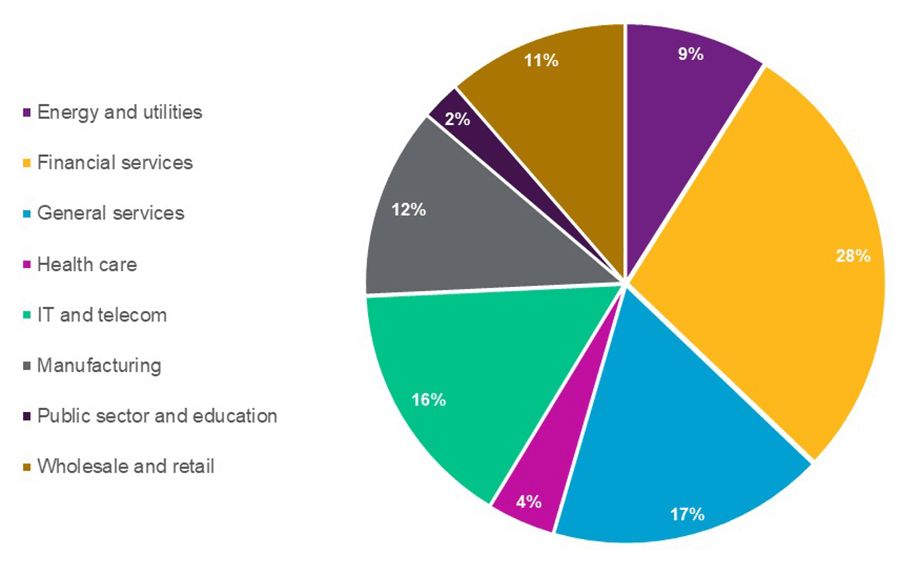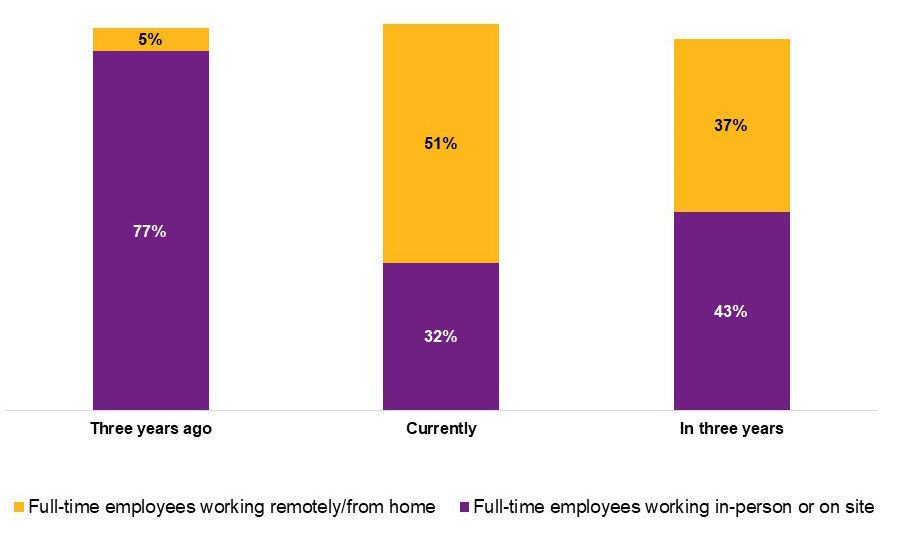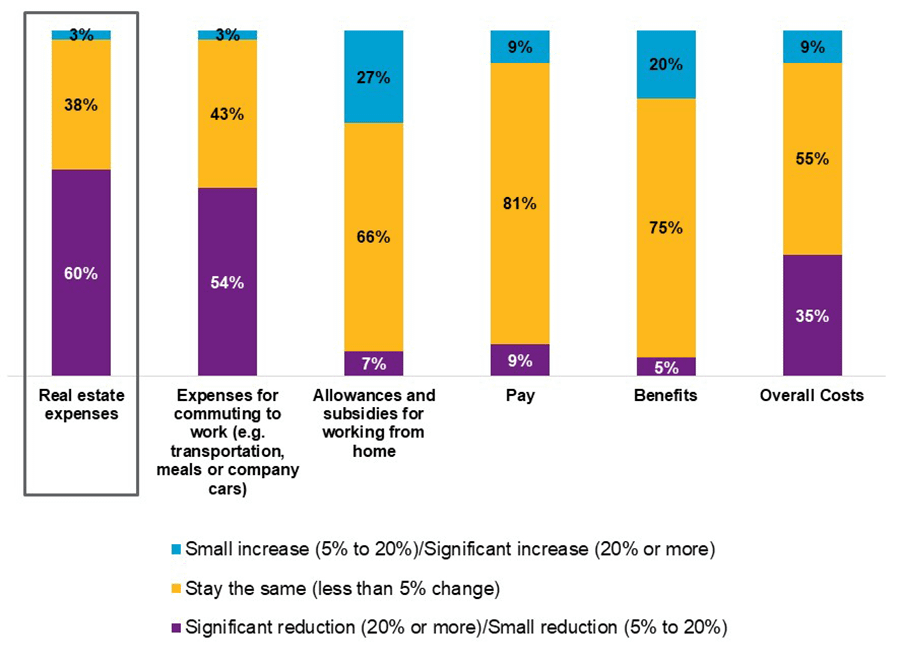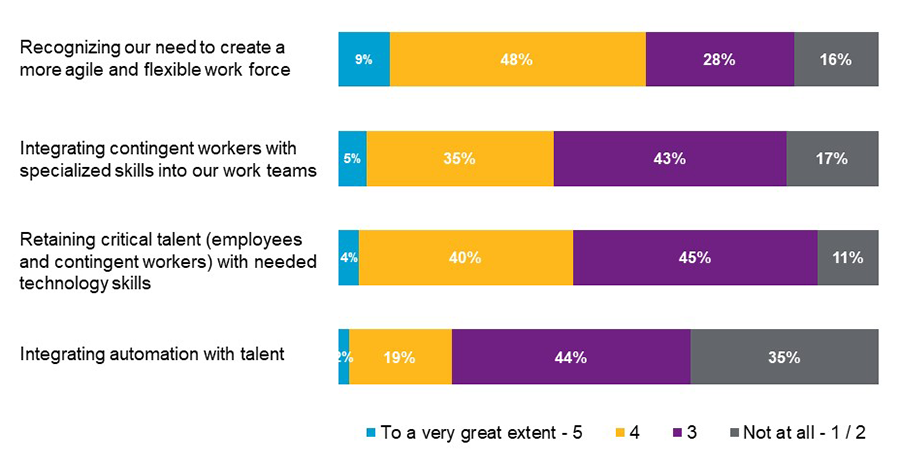Highlights of key findings, Great Britain
Unlock More
The key priorities for organisations
Research findings are based on responses from 167 organisations in the United Kingdom employing 2.41 million employees. The survey fielded between October 6 and 21, 2020.

Respondent profile:
The onset of the COVID-19 pandemic meant that working from home became the new normal for many people overnight, and employers do not expect traditional working habits to resume once the crisis is over. This change will have momentous implications for organisations, spanning everything from how people are motivated and rewarded to how work gets done and what workplaces of the future will look like.
Workplaces were already becoming more flexible before the crisis hit; however, the pandemic has rapidly accelerated the pace of change. In three years’ time, companies expect that 37% of their employees will be working from home (three years ago, only 5% were doing so).
“This is a huge opportunity to renegotiate the employment contract. It is a chance to reset and engage people in a new and meaningful way.”
Hazel Rees | Senior Director, Head of GB Rewards
“This is a huge opportunity to renegotiate the employment contract,” says Hazel Rees, senior director and head of the GB rewards business at Willis Towers Watson. “Companies that get it right will gain a real competitive advantage. It is a chance to reset and engage people in a new and meaningful way.”

When the pandemic hit the UK, organisations had to move to remote working very quickly. Companies may have addressed the immediate logistical challenges, but many are yet to implement other important changes which are needed to support a flexible working culture. So, what should companies consider over the next 12-18 months?
A key priority is putting policies in place to support flexible working. At present, companies still have work to do, according to the survey findings. Almost three in ten have not yet written a formal policy or set of principles to manage alternative work arrangements. However, it is an important priority for most: three- quarters of organisations that do not have a formal policy or set of principles for working from home or flexible working are planning to adopt one in 2021.
Working environments are unlikely to return to their pre-pandemic norms. Therefore, companies should think about how to rewrite the rules of their relationship with employees. With people working in a variety of environments, employers should think about what will keep them motivated. More than half of our survey respondents (56%) believe that new work requirements will necessitate a hybrid reward model.

One way to frame this discussion is by looking at reward budgets within the context of companies’ overall costs. In future, companies expect the shape of their costs to change. Most organisations expect a decrease in commuting and real estate expenses in 2021. A quarter expect that their working-from-home allowances will increase. Overall, the majority of employers (64%) expect their overall costs to stay the same.
Some of the savings that employers expect to make on real estate could be reallocated to reward programmes. “Companies should consider how to optimise their reward spend so that it has the greatest impact on employees,” says Ruchi Arora, senior director, talent management & rewards practice leader at Willis Towers Watson.
Workplaces are becoming more agile

Companies are bidding farewell to traditional hierarchies and defined job roles. Instead, they are seeking to bring in skilled help more flexibly when they need it. Organisations are also looking inward, seeking to build a better picture of the expertise that already exists in-house and to deploy it more effectively.
While almost three in five organisations are effective at recognising their need to create more agile workforces, some are currently being hindered by shortcomings in strategy, systems and other areas. For example, 40% of organisations still say it is a significant challenge to integrate workers with specialist skills into their work teams and only 17% say they are very effective at doing so.
“It is about making sure you organise work, jobs and skills and have transparent frameworks to help employees understand how they can help develop in the organisation and deploy their skills very transferably”
Ruchi Arora | Senior Director, Talent Management & Rewards Practice Leader
HR leaders should focus on developing a clearer picture of the existing skills in their workforce and identifying any gaps over the next year. “It is about making sure you organise work, jobs and skills and have transparent frameworks to help employees understand how they can develop within the organisation and deploy their skills very transferably, not just in the area they work in but into other areas,” says Arora.
Wellbeing has been a huge challenge for many during the pandemic. Working in more agile and flexible environments will bring its own challenges for employees, such as maintaining a healthy work-life balance and dealing with loneliness. Employers recognise this, with 42% saying their health and wellbeing programmes need to change to provide the security necessary to support their employees in an agile workplace.
Employers will need to think more about employee wellbeing in the round, rather than purely in the workplace. Practical benefits are likely to prove popular. These may range from subsidies to help people to make their at-home working arrangements more comfortable, to support with childcare.
In these hugely uncertain times, people’s financial resilience has been tested. Feeling secure about money can contribute enormously to people’s sense of security and wellbeing. Accordingly, many employers are putting financial education at the heart of their wellbeing strategy, helping employees to gain a greater sense of control.
Employers are changing how they talk to people and rethinking the tools that they use to keep people engaged and retained. The pandemic has blurred home and work boundaries in an unprecedented way, but there have been some upsides.
From children making unexpected video conference cameos to seeing glimpses of leaders’ homes, organisations have had to become more human as a result of the pandemic. This is being echoed in their communications, which are evolving very rapidly at present.
The best companies are engaging with their employees as if they were customers. They are also putting infrastructure in place to help employees feel like part of a team, even when they are working remotely.
In fact, flexible working is itself seen as an engagement and retention tool. While the pandemic accelerated the pace of the flexible working shift, employers are now seeing engagement as an important reason to continue to provide alternative work arrangements.
Over half (56%) currently see maintaining or increasing employee engagement as a reason for providing alternative work arrangements; this increases to 68% when HR leaders look ahead to Q1 of 2021.
Unlock More
How can leaders ensure their companies are ready and able to maximise the opportunities that a flexible approach brings (and minimize the challenges):
| Title | File Type | File Size |
|---|---|---|
| Flexible Work and Rewards Survey - Highlights of key findings, GB | .7 MB |